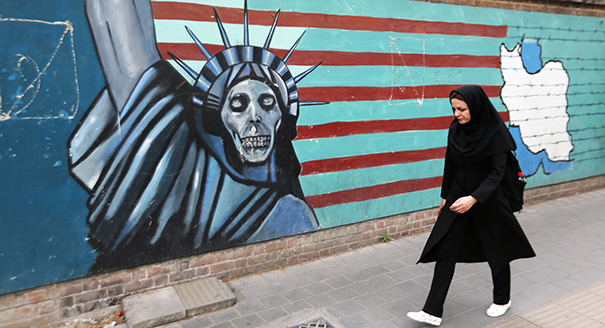Among the U.S. strategic objectives in the Middle East should be to bolster a promising new government in Baghdad, counter Tehran’s support for the murderous regime of President Bashar al-Assad in Syria, and minimize, as much as possible, the humanitarian costs of recent sanctions imposed on Iran. While successfully achieving any of these goals is a long shot, there may be a single policy initiative that can hit the three birds with one stone.
To begin, Iraq is among the countries most impacted by Trump’s decision to withdraw from the nuclear deal with Iran and renew broad economic sanctions against Tehran, which cover, among other sectors, the Iranian oil, shipping, and financial industries. Iraq imports nearly $6.5 billion in Iranian goods annually—around 16 percent of Iraqi non-oil imports—including around $2 billion annually of Iranian agricultural products and foodstuffs. Iraq has also come to rely heavily on Iranian electricity, construction materials, automobile parts, and financial services. In reaction to the emergence of the Islamic State group in 2014, worried Iraqis poured millions of dollars into Iranian bank accounts.
Forcing Iraq to abide by U.S. sanctions against Iran could sabotage the economic prospects of a nascent Iraqi government that is currently among the Middle East’s few sources of optimism. Newly appointed Prime Minister ‘Adel ‘Abdul-Mahdi, a French-educated economist and Iraq’s former oil minister, has been described by one keen observer as a “sober, pragmatic and moderate statesman respected by effectively every Iraqi—a rare feat in a fractured country.” The newly appointed president, Barham Salih, a British-trained engineer, former prime minister of the Kurdistan Regional Government, and founder of the American University of Iraq Sulaimani, is among the most dynamic, forward-thinking political leaders in the entire Middle East.
‘Abdul-Mahdi and Salih already face overwhelming obstacles leading a country fraught with corruption and sectarian discord, rebuilding itself after the barbarities inflicted by the Islamic State. Consequently, the Trump administration should continue to provide Iraq with exemptions from the Iran sanctions, but on one important condition: That Baghdad no longer allow Tehran free rein to use Iraq as a way station to arm and finance allies such as the Assad regime and Lebanon’s Hezbollah. By making this condition openly, the U.S. may find support from an Iraqi public that increasingly resents Tehran’s outsized role in their country’s affairs. Earlier this year protestors chanting “Iran, Out!” set fire to the Iranian Consulate in Basra.
Curtailing Iranian military and financial support for the Assad regime is crucial to any U.S. strategy in Syria. Since 2011 Tehran has spent tens of billions of dollars and mobilized a 40,000-strong militia—including thousands of destitute Afghan refugees—in order to prevent Assad’s collapse. The effect on Syrian society has been devastating, including over 500,000 casualties, nearly 13 million displaced, and over 100 incidents of the Assad regime’s using chemical weapons against its own people, often civilians.
Concurrent with U.S. efforts to bolster decent government in Baghdad and restrain a murderous one in Damascus, the U.S. should help ensure that Tehran’s revenues from its commercial relations with Iraq not simply enrich the Islamic Revolutionary Guards Corps, but serve as an authorized means for Tehran to import critical items such as pharmaceuticals and medical equipment. Economic sanctions are akin to chemotherapy in that they often harm both healthy and malignant cells. The Trump administration should do its utmost to limit the humanitarian costs of indiscriminate sanctions on Iran.
Clearly, there should be no illusions about a scandal-plagued, internationally reviled, chronically unfocused American president’s ability to try and promote more decent government abroad. Nor should we have any illusions about the challenges facing Washington’s regional allies and the nature of its regional adversaries. Iran will continue to do everything in its power to arm and finance Assad’s murder machine, Iraq’s government will still face an uphill battle against corruption and extremism, U.S. economic sanctions will invariably harm innocent Iranians, and Tehran will seek to exaggerate this impact to show how the United States is punishing an Iranian population that it purports to want to support.
Mark Twain famously said that giving up smoking was the easiest thing in the world, “I know because I've done it thousands of times.” The same can be said for Western grand strategies in the Middle East that are earnestly conceived, but often serve to exacerbate the very problems they hope to resolve. At the same time, however, we don’t have the luxury of cynicism, apathy, or simply “waiting Trump out.” Mass killings in Syria have fueled the greatest refugee crisis since World War II and called into question the continued viability of projects such as the European Union. On the rare occasion there exists a policy that can, however modestly, simultaneously curtail Assad’s murder machine, aid decent governance in Iraq, and allay human suffering in Iran, we should explore it.






